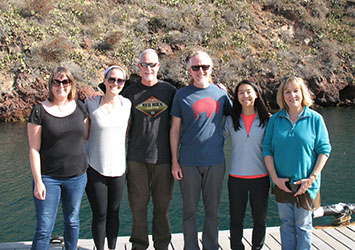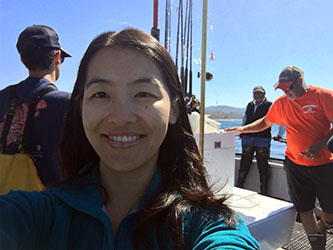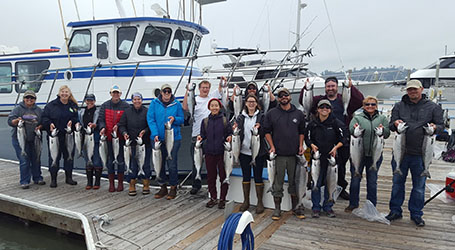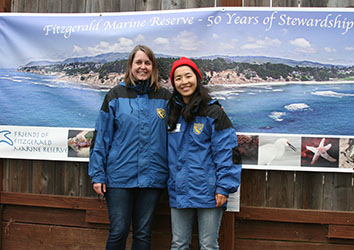While conducting beach seine surveys for surf zone fish at Año Nuevo State Marine Reserve, Chenchen Shen and researchers from Moss Landing Marine Laboratories found a juvenile salmon shark washed up on the beach.

Marine Protected Areas Management Project staff from Eureka, San Carlos, and Los Alamitos come together for a meeting at USC’s Wrigley Marine Science Center on Catalina Island (from left to right: Sara Worden, Amanda Van Diggelen, Steve Wertz, Mike Prall, Chenchen Shen, Becky Ota).

Chenchen Shen on a research fishing trip with CCFRP at Point Lobos State Marine Reserve.

Ocean Salmon Project and Groundfish Management Project staff return from a successful fishing trip along the San Francisco coast (from left to right back row: Melodie Palmer-Zwahlen, Traci Larinto, Melanie Parker, Joanna Grebel, Caroline McKnight, Melissa Mandrup, Alex Letvin, Barry Miller, John Budrick; from left to right front row: Chenchen Shen, Jennifer Simon, Andrew Klein, Vanessa Gusman, Marci Yaremko, Brett Kormos).

Chenchen Shen and Marine Protected Areas Management Project co-worker Sara Worden representing CDFW and conducting public outreach at an event celebrating the 50th anniversary of Fitzgerald Marine Reserve, a San Mateo County Park located within the Montara State Marine Reserve and Pillar Point State Marine Conservation Area.
Scattered along the coast of California lies a network of 124 protected marine and estuarine waters. These Marine Protected Areas (MPAs) encompass around 16 percent of California’s state waters from Oregon to the US/Mexico border. MPAs have different classifications, such as State Marine Reserve or State Marine Conservation Area, but they all have the same goal: to protect and conserve marine life and habitat in accordance with the Marine Life Protection Act. CDFW is the lead management agency overseeing the MPA network pursuant to the Marine Managed Areas Improvement Act.
The MPA Statewide Management Project is run by a small team of dedicated staff within the Marine Region. One of these staff is Chenchen Shen, an environmental scientist working out of San Carlos in the San Francisco Bay Area. Chenchen’s focus is on MPAs from the Sonoma Coast down to San Luis Obispo. She joined the Department in 2017 and worked for the Ocean Salmon Project for two years before joining MPA Management. CDFW is a member of a larger collaborative MPA Management Program.
Chenchen grew up in the Bay Area and completed her undergrad at Princeton University before earning her PhD at Oregon State University.
What piqued your interest in biology and marine ecosystems?
Both of my parents work in medical science and my interest in biology stemmed from their influence. I was originally leaning towards the medical field, but as I went through the coursework from cells to ecosystems in high school biology, I found myself more interested in biological systems that are outside the human body and affect how the environment works. That led me to pursue an undergraduate degree in ecology, followed by a PhD specializing in rocky intertidal marine systems.
A lot of people grow up wanting to become a marine biologist, drawn to the big things like sharks and whales and coral reefs. I was like that too, but in college I got an internship at the Bermuda Institute of Ocean Sciences that provided me with a different perspective. During that internship I measured the nutrients in sea water and investigated how phytoplankton would grow in different nutrient environments. That really helped me gain an appreciation for the small, unseen things in the ocean and understand it from the bottom up.
How did you get started with CDFW?
I like doing research, but I always wanted to do something more applied and focused in conservation and management after grad school. That’s how I ended up at CDFW, where science plays a central role in dealing with on the ground issues balancing resource use with conservation.
What exactly is the MPA Management Program?
In 2012, California created the nation’s first statewide ecologically connected network of MPAs. The network is globally recognized for its highly collaborative, transparent and iterative planning process guided by the advice of scientists, stakeholders, resource managers and interested members of the public from 2004 to 2012. It is one of the largest ecologically connected MPA networks in the world. After the network was established, the MPA Management Program was created to address four main management tasks: research and monitoring, outreach and education, enforcement and compliance, and policy and permitting. CDFW works with many partners to implement this program, including the Ocean Protection Council, state and federal agencies, tribes, the MPA Collaborative Network, an array of academic researchers and many others.
The MPA Network is adaptively managed, and the program is set to be reviewed and evaluated by the Fish and Game Commission every 10 years. We’re approaching our first decadal management review in 2022, so we’re currently getting ready to compile information from each of the program’s four focal areas and assess what we’ve learned. Although we have some regional reports from baseline studies that were conducted in the past, next year will be the first time we get reports back from statewide long-term monitoring projects. Early results from baseline studies include some positive trends, such as greater numbers of black rockfish, lingcod and cabezon in kelp forests located in MPAs compared to similar locations outside MPAs along the central coast. It will be exciting to compare the new data with the baseline data and provide an update on how our MPAs have been doing. It will be a very big milestone for our project, CDFW and the State of California.
What is a typical work day like for you?
My work is incredibly varied. I coordinate with many different partners on all sorts of MPA management issues and support their work. I receive research updates and proposals that require review and feedback. I do outreach, such as writing and reviewing two blog series that are published on the CDFW Marine Management website. I am also working on utilizing the California Recreational Fisheries Survey data to help get a sense of how MPAs have affected fishing and how historical fishing levels affect MPA efficacy.
Since the pandemic, I have been working from home. People might assume that I do a lot of field work, but MPA monitoring is contracted to outside researchers and not conducted within the department. With our handful of staff, we don’t have the capacity to deploy multiple full-blown research programs on a statewide scale. We maintain relationships with the MPA monitoring groups so if they need help in a specific area where we have staff available, we go out and help with those efforts, during a normal year. Instead of specializing in particular species or habitats, our team gets to sample a bit of everything.
What is your favorite part about working with the MPAs?
California is a global leader when it comes to MPAs, because of our ecologically connected network. I like working on something that’s so pioneering, where there is a lot to learn. I also really love the diversity of the topic area, covering many different habitats and species as well as looking into the relationship between people and MPAs. And I find that working with many internal and external partners on MPA management is very rewarding because it creates a feeling of being part of a greater whole.
But working with so many different people must be challenging in its own way…
Yes, I’d have to say the hardest part of my job is managing such a big network with limited capacity and reliance on many partners. It’s challenging to keep up with everything that is going on, so there are always missed opportunities when it comes to meetings, outreach events, collaborations and publications. It is a big arena, and while we know we can’t do everything, we also don’t want to get lost as the managing agency for the network.
What are the challenges facing the MPA network?
One existential issue is the fact that we’re really invested in these MPAs but they can’t solve everything. Climate change and its associated problems, like marine diseases and invasive species, are threatening marine ecosystems everywhere and MPAs do not create an invisible forcefield against these stressors. While we realize there are limitations to what MPAs can do, we have gathered a working group of scientists that has been researching how MPAs may contribute to climate resilience, what we still don’t know, and how to get closer to some answers. A report of their findings and recommendations will be available next year.
Another challenge is getting the word out to the public about MPAs. Unlike with state parks where there are clear boundaries on land, MPAs don’t have a marked boundary around them to distinguish them from the surrounding waters. It’s hard to gain an appreciation for, or even recognize, something you can’t see. More communication about MPAs and the science behind them is essential to the success of the MPA Network.
Speaking of public awareness and involvement, how can the program attract more people from diverse backgrounds and how do you feel about diversity within the program overall?
As an Asian American, I feel that diversity is lacking within our field. However, the field is becoming more aware of this lack of diversity, especially with the current social justice movement.
I think many people in the field were introduced to nature and the outdoors by their family, but my family and friends growing up were pretty “indoorsy”, and I think that is fairly typical of many non-white and immigrant communities. I approached my career path from more of an academic angle and my appreciation for nature grew from there. Outdoor education for kids, especially for underrepresented groups, may help inspire a more diverse generation of environmental stewards.
We have to ask: What is your favorite intertidal species?
I always get really excited when I find an octopus, which doesn’t happen very often, so it’s a special treat. They’re so mysterious and smart. They can change color and texture to blend in with their surroundings or to communicate, and they’re crazy escapists. The intertidal often looks uninteresting at the surface, but the more you learn about it, the more you discover it is full of clues, hiding spots, competing forces and change.
CDFW photos